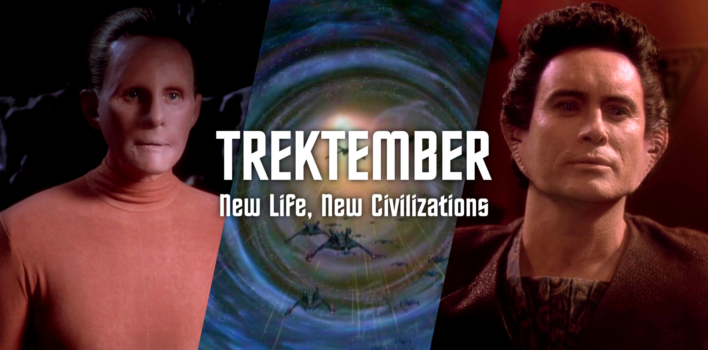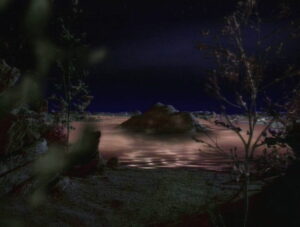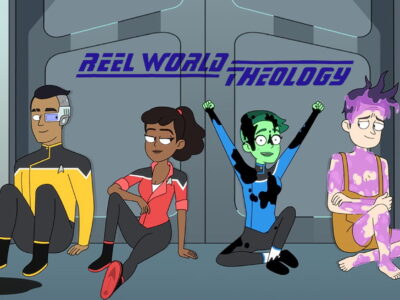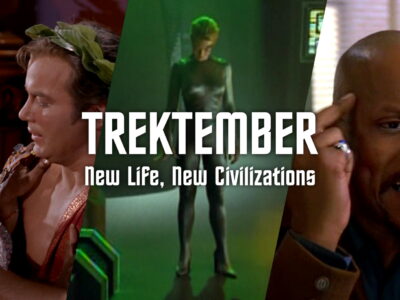What You Control Can’t Hurt You: Fear, Victimhood, and the Dominion
From cowering victim to preemptive striker, from passive aggression to dedicated isolationism, fear leads both people and societies to pretty much every extreme of reaction. Still, perhaps the most unexpected result of fear is, paradoxically, an aggressive dominance; to boldly march into the room and take charge for fear that you would otherwise be taken charge of.
Fans of Star Trek: Deep Space Nine would, no doubt, recognize this as the basic motivation of the Dominion, a vast, fascist government that dominates the majority of the Gamma Quadrant and which eventually wages a massive war against the Federation and its neighbors.
And yet, for all their aggression and dominance, the Dominion proves itself to be operating at the behest of a relatively small group of shape-shifting beings who have dubbed themselves Changelings. Having begun as simple humanoids, these proto-Changelings somehow managed to alter their very molecular make-up (these people seemed to be fantastically advanced genetic engineers even before their species-wide transformation) into ageless, shapeless beings capable of mimicking anything…or anyone.
They found themselves, in the intervening eons, distrusted by ‘Solids’ (their term for non-shape-shifters) and often persecuted by them. Eventually these beings decided that “…what you can control can’t hurt you,” (“The Search, Part II”) and became the Founders of the Dominion. They even used their skills as genetic engineers to upraise a species of hominids into the Vorta, their caste of managers and bureaucrats, as well as creating an entire species of brutal slave soldiers known as the Jem’Hadar. Clearly they were so wrapped up in fear as a race that they could not even trust their own subjects and instead opted to build their own, instituting built-in flaws like addiction (to a drug only they could provide), suicide implants and even a genetically-programmed reverence for themselves as gods within their creations.
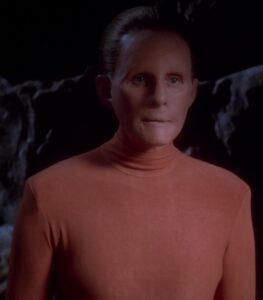 With their slave-citizenry, the Changelings founded an empire that conquered its way across the greater part of an entire galactic quadrant, with clear signs that they had every intention of expanding their control, their order, across all the galaxy. This order was, at times, simply like ancient Rome; simply call the Dominion your masters and pay them tribute and you may live unimpeded (see the Dosi or the Karemma from “Rules of Acquisition”). Those who resisted, however, they brutally subjugated: methods ranged from specialized plagues to keep your planet a perpetually dying apocalypse world (“The Quickening”) to straightforward, unyielding planetary conquest (“Sanctuary” and “Shadowplay”) to full on, species-wide genocide (“What You Leave Behind, Part I”). In another example of the Dominion’s methodology, their highest-ranked Vorta declares their plans to kill every inhabitant of Earth upon its conquest just to quell the possibility of revolt (“Sacrifice of Angels”).
With their slave-citizenry, the Changelings founded an empire that conquered its way across the greater part of an entire galactic quadrant, with clear signs that they had every intention of expanding their control, their order, across all the galaxy. This order was, at times, simply like ancient Rome; simply call the Dominion your masters and pay them tribute and you may live unimpeded (see the Dosi or the Karemma from “Rules of Acquisition”). Those who resisted, however, they brutally subjugated: methods ranged from specialized plagues to keep your planet a perpetually dying apocalypse world (“The Quickening”) to straightforward, unyielding planetary conquest (“Sanctuary” and “Shadowplay”) to full on, species-wide genocide (“What You Leave Behind, Part I”). In another example of the Dominion’s methodology, their highest-ranked Vorta declares their plans to kill every inhabitant of Earth upon its conquest just to quell the possibility of revolt (“Sacrifice of Angels”).
The Dominion was not a benevolent government, is my main point here.
But then the question must be raised: why explore this fictional empire? At first it could be simplified as just another generic, evil empire as in Star Wars or The Lord of the Rings. However, it is that initial motivation of fear that differentiates the Dominion from The Galactic Empire or Sauron’s Kingdom. That motivation is what makes the Dominion worth examination because it is a very relatable motive that speaks even to our current climate of 2020.
For better or worse, we live in a culture that glorifies victimization. Many current issues, ranging from the important matters of justice to the piddling pedantics of entertainment, are being played out with the weapons of perception of victimhood. I will not go into specifics only to avoid derailing this essay. Instead I want to focus on how this applies, specifically, to modern American Christians.
Jesus said to His disciples, “if the world hates you, keep in mind that it hated Me first. If you belonged to the world, it would love you as its own. As it is, you do not belong to the world, but I have chosen you out of the world. That is why the world hates you. Remember the words I spoke to you: ‘No servant is greater than his master.’ If they persecuted Me, they will persecute you also.” (John 15:18-20 NIV)
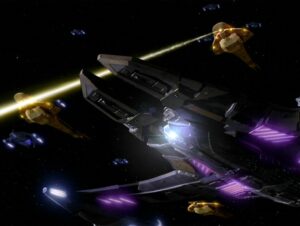 This statement, while obviously true, is often (and perhaps deliberately) misused. Like the Founders, the assumption that you are persecuted can easily lead to a sense of self-righteousness, founded in the identity of victimhood, that can blind you to your own faults. In other words, be careful not to see yourself as the infallible hero of your own story and, by extension, all who would oppose you as villains.
This statement, while obviously true, is often (and perhaps deliberately) misused. Like the Founders, the assumption that you are persecuted can easily lead to a sense of self-righteousness, founded in the identity of victimhood, that can blind you to your own faults. In other words, be careful not to see yourself as the infallible hero of your own story and, by extension, all who would oppose you as villains.
The Founders as a group are represented in Deep Space Nine by a single Changeling known only as “the Female Changeling.” As the Dominion War closes at the end of the show’s run, and the fortunes of war start to turn against the Dominion, The Female Changeling often speaks of herself and her people as if they were the downtrodden victims of Solid aggression. She conveniently ignores the fact that she speaks these self-pitying lines from a planet occupied through deception, to beings enslaved for uncounted generations, while waging a war instigated by her people. Even without taking into account the myriad tortured, brutalized worlds in the Gamma Quadrant, just from the Dominion War itself, hundreds of millions (estimating low) have died to resist the “order” these “victims” would bring.
Similarly, although clearly on a vastly lower scale, I have often seen Christians claiming that they are persecuted even as they take part in decidedly un-Christian behavior: Christians lashing out with epithets when criticized, complaining obnoxiously to store clerks and managers about the phrasing of holiday greetings, using the system to legally bring down their worldly opponents, engaging with both fellow Christians and non-Christians in the same pecking-order nonsense Jesus Himself decried in Luke 22:25-27, and a plethora of other examples. Again, these are clearly not the same levels of wrong as the Dominion’s, but then fantasy allows us to examine life through extreme exaggeration.
But how is it to your credit if you receive a beating for doing wrong and endure it? But if you suffer for doing good and you endure it, this is commendable before God. To this you were called, because Christ suffered for you, leaving you an example that you should follow in His steps.
—1 Peter 2:20-21, NIV
These are not collective issues, but individual. Each of us can choose to treat our faith like another tick-box of identity politics, or we can choose to allow our faith to change us into something…not of this world. Just as Odo eventually brought healing to his people through a simple act of mercy, we can also affect our fellow Christians by our example. Let’s not just act like another angry, politicized demographic when our enemies attack us (and we often are being attacked, let no one deny that). Let’s confound the world by being literal Christians (little Christs) and doing what He did.


